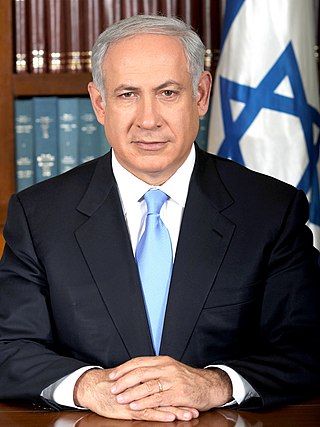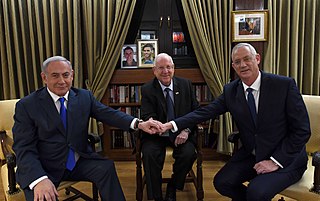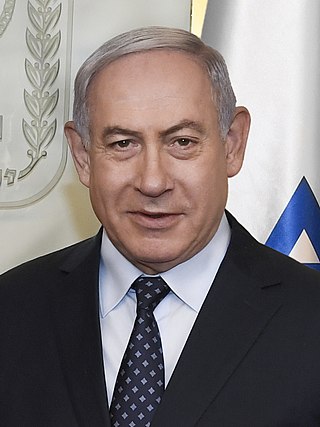
Likud, officially known as Likud – National Liberal Movement, is a major right-wing political party in Israel. It was founded in 1973 by Menachem Begin and Ariel Sharon in an alliance with several right-wing parties. Likud's landslide victory in the 1977 elections was a major turning point in the country's political history, marking the first time the left had lost power. In addition, it was the first time in Israel that a right-wing party won the plurality of the votes. After ruling the country for most of the 1980s, the party lost the Knesset election in 1992. Likud's candidate Benjamin Netanyahu won the vote for Prime Minister in 1996 and was given the task of forming a government after the 1996 elections. Netanyahu's government fell apart after a vote of no confidence, which led to elections being called in 1999 and Likud losing power to the One Israel coalition led by Ehud Barak.

Gideon Moshe Sa'ar is an Israeli politician who served as Minister of Justice between 2021 and 2022. Sa'ar was previously a member of the Knesset for the Likud between 2003 and 2014, Deputy Prime Minister for a brief spell in 2021, as well as holding the posts of Education Minister (2009–2013) and Minister of the Interior (2013–2014). In 2019 Sa'ar returned to the Knesset and unsuccessfully ran against longtime leader Benjamin Netanyahu for the leadership of the Likud; he left the Knesset the following year after establishing a new party called New Hope.

Moshe Kahlon is a retired Israeli politician. Between 2003 and 2013 he served as a member of the Knesset for Likud, and as Minister of Communications and Minister of Welfare & Social Services. After taking a break from politics, he founded the Kulanu party in 2014, and returned to the Knesset the following year. In 2015, he was appointed Minister of Finance in the Netanyahu IV cabinet. On 12 January 2020, Kahlon announced that he would be retiring from politics.

Orly Levy-Abekasis is an Israeli politician and former member of the Knesset. Formerly a model, Levy-Abekasis first entered the Knesset in 2009 as a representative of Yisrael Beiteinu, but left the party in 2017 to sit as an independent. In 2019, she formed her own party, Gesher, to contest the April 2019 elections. Although the party failed to win a seat, she returned to the Knesset following the September 2019 elections, in which Gesher ran together with the Labor Party. In May 2020 she was appointed by Prime Minister Netanyahu as the newly created Minister for Community Empowerment and Advancement.
Early elections for the nineteenth Knesset were held in Israel on 22 January 2013. Public debate over the Tal Law had nearly led to early elections in 2012, but they were aborted at the last moment after Kadima briefly joined the government. The elections were later called in early October 2012 after failure to agree on the budget for the 2013 fiscal year.
Yesh Atid is a centrist, liberal political party in Israel. It was founded in 2012 by former TV journalist Yair Lapid, the son of the former Shinui party politician and Israeli Justice Minister Tommy Lapid.

Early elections for the twentieth Knesset were held in Israel on 17 March 2015. Disagreements within the governing coalition, particularly over the budget and a "Jewish state" proposal, led to the dissolution of the government in December 2014. The Labor Party and Hatnuah formed a coalition, called Zionist Union, with the hope of defeating the Likud party, which had led the previous governing coalition along with Yisrael Beiteinu, Yesh Atid, The Jewish Home, and Hatnuah.

The thirty-third government of Israel, also known as the third Netanyahu government, was formed after the 22 January 2013 Knesset elections, took office on 18 March 2013, and served until 14 May 2015. The Prime Minister was Benjamin Netanyahu of Likud; the government was a coalition of Likud, Yisrael Beiteinu, Yesh Atid, The Jewish Home, and Hatnuah.
Politics in Israel are dominated by Zionist parties. They traditionally fall into three camps, the first two being the largest: Labor Zionism, revisionist Zionism, and religious Zionism. There are also several non-Zionist Orthodox religious parties and non-Zionist secular left-wing groups, as well as non-Zionist and anti-Zionist Israeli Arab parties.
Early legislative elections were held in Israel on 9 April 2019 to elect the 120 members of the 21st Knesset. Elections had been due in November 2019, but were brought forward following a dispute between members of the current government over a bill on national service for the ultra-Orthodox population, as well as impending corruption charges against incumbent Prime Minister Benjamin Netanyahu.

Kulanu was a centrist political party in Israel founded by Moshe Kahlon that focused on economic and cost-of-living issues.

The thirty-fifth government of Israel, or the Netanyahu–Gantz government, was the government of Israel which was sworn in on 17 May 2020 and dissolved on 13 June 2021.
In the run-up to the April 2019 Israeli legislative election, which was held on 9 April, various organisations carried out opinion polling to gauge voting intentions in Israel. Results of such polls are displayed in this article, ranging from the previous legislative election, held on 17 March 2015, to the 2019 election.
Snap legislative elections were held in Israel on 17 September 2019 to elect the 120 members of the 22nd Knesset. Following the previous elections in April, incumbent Prime Minister Benjamin Netanyahu failed to form a governing coalition for a second consecutive time. On 30 May, the Knesset voted to dissolve itself and trigger new elections, in order to prevent Blue and White party leader Benny Gantz from being appointed Prime Minister-designate. This election marked the first time the Knesset voted to dissolve itself before a government had been formed.
Blue and White is a centrist and liberal political alliance in Israel. It was established by the Israel Resilience Party, Yesh Atid and Telem to run in the April 2019 Knesset election, in hopes of defeating Prime Minister Benjamin Netanyahu. Blue and White defines itself as a pluralistic alliance representing all citizens on the political and religious spectrums. The phrase "blue and white" refers to the colors of the Israeli flag, and is colloquially used to describe something as being typically Israeli.
Legislative elections were held in Israel on 2 March 2020 to elect members of the twenty-third Knesset. The result was initially a stalemate, which was resolved when Likud and Blue & White reached a coalition agreement. Under the terms of the agreement, the premiership would rotate between Benjamin Netanyahu and Benny Gantz, with Gantz given the new position of Alternate Prime Minister until November 2021. These elections followed the continued political deadlock after the April and September 2019 Knesset elections.

A leadership election was held by the Likud party on 26 December 2019. Incumbent Benjamin Netanyahu defeated Gideon Sa'ar by a large majority.

The 2018–2022 Israeli political crisis was a period of political instability in Israel, in which five Knesset snap elections were held in a span of less than four years: in April 2019, September 2019, March 2020, March 2021 and November 2022.
Legislative elections were held in Israel on 1 November 2022 to elect the 120 members of the 25th Knesset. The results saw the right-wing national camp of former prime minister Benjamin Netanyahu win a parliamentary majority, amid losses for left-wing and Arab parties, as well as gains by the far right.

The thirty-sixth government of Israel, or the Bennett–Lapid government, was the cabinet of Israel that was formed on 13 June 2021 after the 2021 Israeli legislative election. On 2 June 2021, a coalition agreement was signed between Yesh Atid, Blue and White, Yamina, the Labor Party, Yisrael Beiteinu, New Hope, Meretz, and the United Arab List. The cabinet was succeeded by the thirty-seventh government of Israel, led by Benjamin Netanyahu, on 29 December 2022.















